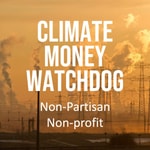Climate Money Watchdog – Details, episodes & analysis
Podcast details
Technical and general information from the podcast's RSS feed.

Climate Money Watchdog
Dina Rasor & Greg Williams
Frequency: 1 episode/29d. Total Eps: 39

Recent rankings
Latest chart positions across Apple Podcasts and Spotify rankings.
Apple Podcasts
🇫🇷 France - government
13/05/2025#100
Spotify
No recent rankings available
Shared links between episodes and podcasts
Links found in episode descriptions and other podcasts that share them.
See all- https://www.stanford.edu/
137 shares
- https://colorofchange.org/
92 shares
- https://www.washingtonpost.com/
68 shares
RSS feed quality and score
Technical evaluation of the podcast's RSS feed quality and structure.
See allScore global : 73%
Publication history
Monthly episode publishing history over the past years.
Lew Daly - 45Q Carbon Capture Tax Credits are a Financial Disaster in the Making
Season 4 · Episode 2
vendredi 2 mai 2025 • Duration 01:13:41
Our guest tonight is Lew Daly, Senior Fellow for Climate and Energy Policy at Just Solutions, where he works in partnership with state and federal organizations and networks in pursuit of a just and equitable clean energy transition.
His previous 15 years work in the public policy field includes appointments such as:
- Director of Policy and Research and Senior Policy Analyst for Climate Equity at Demos
- Deputy Director of Climate Policy at the Roosevelt Institute
Lew is a lifelong resident of New York State--Born and raised in Onondaga County, Central New York State, and has been based with his family in Wester Harlem, New York City, since 1999. His New York service in the field includes:
- Steering Committee member of the New York Renews Coalition from 2017-2020.
- Co-coordinator: New York Renews Policy Development Committee, supporting the development and passage of the nation-leading Climate Leadership and Community Protection act in 2019.
- Member of the New York City Offshore Wind Advisory Council in 2022 and 2023.
He has also worked internationally as a US member of the Global Well-Being Lab of the Presencing Institute and Germany's Global Leadership Academy, and as an International Advisory Board Member of the Centre for the Study of Governance Innovation at the University of Pretoria.
With Doug Koplow of Earth Track, Lew is the author most recently of the report, Taxpayer Costs for Carbon Capture, Utilization, and Storage, just out from Just Solutions and Earth Track.
In addition to his extensive policy work, Lew's commentaries and feature articles have appeared in the New York Times, the Washington Post, the New Republic, Democracy Journal, Boston Review, Grist, and many other publications.
Visit us at climatemoneywatchdog.org!
Natural Gas is Worse than Coal - Dr. Robert Howarth
Season 4 · Episode 1
jeudi 13 mars 2025 • Duration 48:55
While the fossil fuel industry continues to promote "natural gas" as a relatively "clean" energy source, Dr. Robert Howarth has argued since since his seminal report in 2011 that methane (which makes up roughly 5% of "natural gas") poses a greater threat to humankind than "dirty" options like coal and oil. This is particularly true of methane produced through hydraulic fracturing ("fracking") Join us for a conversation about what we've now known for more than a decade, and how much more convinced Dr. Howarth is now that we should not be fracking for gas, nor otherwise be using methane as an energy source.
Dr. Howarth is the David R. Atkinson Professor of Ecology & Environmental Biology in the Department of Ecology and Evolutionary Biology at Cornell University. He’s an Earth systems scientist, ecosystem biologist, and biogeochemist. He has worked extensively on environmental issues related to human-induced changes in the sulfur, nitrogen, phosphorus, and carbon cycles, the impacts of global climate change, the interaction of energy systems and the environment, and implementation of 100% renewable energy policies. He is the Founding Editor of the journal Biogeochemistry.
Currently, Howarth serves as one of 22 members of the Climate Action Council, the group charged by law with implementing the aggressive climate goals of New York’s Climate Leadership & Community Protection Act of 2019, often referred to as CLCPA. Howarth has published more than 200 research papers, and these have been cited in other peer-reviewed articles more than 70,000 times, making Howarth one of the ten most cited aquatic scientists in the world. In 2011, Time Magazine named Howarth as one of 50 “People Who Matter” for his research on the greenhouse gas footprint of shale gas produced from hydraulic fracturing, better known as “fracking”.
Topics Discussed Include:
- Why methane is such a concern with regard to climate change
- Why methane emissions are greater than predicted by the gas industry
- Why Dr. Howarth believes methane is worse for the climate than coal
- How some methane leaks are accidental while others are routine, and therefore can't be eliminated
- How OGI thermal cameras are able to see methane and other greenhouse gasses
Further Reading
Dr. Howarth maintains a web site featuring many of the works he's published over the years, including the April 2011 paper on methane leaks from gas fracking.
Visit us at climatemoneywatchdog.org!
Retiring 90% of our Coal Power Plants would Save Money - Michelle Solomon, Energy Innovation
Season 2 · Episode 3
jeudi 2 mars 2023 • Duration 01:02:53
Michelle Solomon is a Senior Policy Analyst in the Electricity program at Energy Innovation, working to accelerate the transition to a clean, affordable, and equitable electricity sector in the United States. We’ve invited her to talk about their recent publication of the third edition of their report - Coal Cost Crossover – which argues that over 90% of coal-fired power plants in the U.S. could be replaced by renewable energy generation at a net cost savings.
Prior to joining Energy Innovation, Michelle earned her Ph.D. in materials science and engineering at Stanford University, where she studied nanoparticles with applications in purifying chemicals for use in medicine and the environment. During graduate school, she also pursued an interest in energy policy and spent a summer working on electric vehicle policy at the California Energy Commission. After graduating, she transitioned full-time into policy as a Congressional Science and Engineering Fellow. As a fellow, she had the chance to work on energy and environment policy for Senator Ed Markey, focusing on a wide range of issues spanning environmental justice to electric vehicle charging.
Michelle holds a Ph.D. and an M.S. from Stanford University in materials science and engineering. She also completed her B.S. in physics at Boston College.
Further Reading:
· Coal Cost Crossover Interactive data visualization
Visit us at climatemoneywatchdog.org!
Citizens Prevail over Venture Capitalists and Carbon Capture - Mike Eisenfeld
Season 2 · Episode 2
jeudi 26 janvier 2023 • Duration 01:01:31
In this climate fight will Big Fossil Fuel, it is hard and rare to have a clear-cut victory. The last time we did a podcast episode with Mike on 7/12/22, his group was fighting to prevent a closing coal-based power plant in Farmington, New Mexico from reinventing itself to keep open using the questionable technology of Carbon Capture and Sequestration (CCS). This was described a June 29, 2022 High Country News article. A company named Enchant led this effort with the backing of financial groups to force this unproven technology through to keep the highly polluting plant open. Once they could not raise enough money privately, they were trying to get federal money to keep the plant going. However, this did not work out and the activists like Mike kept pushing to stop it. Last month, Enchant abandoned its efforts. We wanted to have Mike back on the program to explain what led to the closing of this plant for good and to explore and celebrate the loss of one less coal power plant.
Mike points out that this project was billed as a “demonstration project”, intended to show the potential of carbon capture and sequestration as an approach to combatting climate change. Back in December of 2021, the General Accountability Office (GAO) issued a report titled, “Carbon Capture and Storage: Actions Needed to Improve DOE Management of Demonstration Projects” which showed essentially no success among demonstration projects. Of eight projects, for which we, as taxpayers, paid $684 million, only one achieved operational status. That one plant operated for only three years, closing due to economic infeasibility.
Eisenfeld questioned when DOE and companies promoting these projects will be held accountable for this poor track record. Within the aforementioned report, DOE was described as addressing this by creating a dedicated Office of Clean Energy Demonstrations. After waiting nearly a year, the Biden administration appointed David Crane, the CEO of NRG, the company in charge of Petra Nova, one of the failed carbon capture projects described in the GAO report.
Climate Money Watchdog will be following up on this and other appointments relevant to environmental spending.
Visit us at climatemoneywatchdog.org!
Protecting Communities in an Oil Boom - Kayley Shoup
Season 2 · Episode 1
vendredi 20 janvier 2023 • Duration 01:00:15
Kayley Shoup is an activist with the Citizens Caring for the Future, an environmental group that is affiliated with New Mexico Interfaith Power & Light in Carlsbad, New Mexico. When she moved back to her hometown, she became alarmed at the increase of pollution from the nearby expanded oil and gas fields of the Permian Basin, and is determined to do something about it. Recently, a NASA satellite from its EMIT program, which is designed to measure and characterize mineral dust sources to find new minerals, found a massive methane leak near the Carlsbad gas and oil fields. Kayley describes how her organization works to inform their community using data from a wide range of sources, including NASA and other non-profits such as Earthworks.
Visit us at climatemoneywatchdog.org!
Capturing CO2 with Paint - Steve & Beth McDaniel
Season 1 · Episode 26
jeudi 22 décembre 2022 • Duration 01:09:18
Dr. Steve McDaniel and Beth McDaniel, JD founded and run Reactive Surfaces, and intellectual property firm that develops and patents paints that do more than turn buildings attractive colors and protect them from the elements: They react to the atmosphere in intentional and desirable ways. They are currently in the running to win the most valuable X-Prize contest ever by creating a paint that captures CO2 from the atmosphere more simply, cheaply and scaleably than any direct air carbon technology before it.
The McDaniels founded Reactive Surfaces in 2001 in response to the events of 911. They wanted to know if they could stabilize an enzyme in a coating to protect surfaces against a chemical weapons attack. This original technology is called WMDtox, and it works to decontaminate organophosphorous nerve gases virtually on contact. From there, they have developed other various functional platform technologies using non-toxic bio-based organisms, such as self-cleaning coatings and coatings that are antimicrobial and antiviral.
Carbon Capture Coatings have the power to significantly reduce carbon dioxide in the atmosphere, thereby lessening the impact of global warming. Carbon Capture Coatings are bio-engineered such that, when exposed to sunlight, they capture and fix atmospheric carbon dioxide. These coatings support living cells capable of carrying out photosynthesis, the process by which Nature captures and fixes atmospheric CO2.
Further Reading:
· Carbon Capture Coatings: Next Generation Biomimetic Coatings for Carbon Capture & Removal
· Carbon Capture Coatings: Can Paints and Coatings Save Humanity?
Visit us at climatemoneywatchdog.org!
Weathering a Hurricane in a Town Designed for Climate Change - Ryan Foelske
Season 1 · Episode 25
jeudi 15 décembre 2022 • Duration 58:24
Ryan Foelske a Carbon Free Electricity Program manager at RMI (previously the Rocky Mountain Institute) decided to put his money where his mouth is by buying a home in Babcock Ranch, a community designed to both reduce human contribution to climate change and to be more resilient to the effects of climate change, especially hurricanes. He tells us about his experience weathering hurricane Ian.
Prior to joining RMI, Ryan worked at Deutsche Bank and Brookfield Asset Management as a buy-side equity analyst specializing in global regulated utilities and other publicly listed infrastructure companies. He built financial models, understood and quantified risks, and sought benchmark-beating returns for investors. In addition to his company coverage duties, Ryan helped develop the modeling framework, standardized and aggregated data outputs, and worked on index construction and inclusion.
As we discuss in the episode, resilience is an area of extensive funding under the Infrastructure Investment and Jobs Act and the Inflation Reduction Act. Babcock Ranch has not received any funding under these pieces of federal legislation. Nevertheless we think its resilience measures are worth considering as background for other projects that may receive such funding in the future.
For more information...
Visit us at climatemoneywatchdog.org!
Protecting Communities from Pollution with Alison Steele
Season 1 · Episode 24
jeudi 8 décembre 2022 • Duration 01:06:25
While pollution mitigation and control is vital to the environment, scientists are finding more and more problems for the humans that live near polluting corporate sites. Unfortunately in the name of jobs and profit, companies have produced pollution while ignoring or hiding the human health from their work, often producing what is known as "sacrifice zones" -- areas where the pollution is dangerous for people who often cannot leave. The Environmental Health Project has taken on the difficult job of using health science discern the short and long term effects of gas fracking and plastic production on local populations. On this week's podcast we welcome Alison Steele, who tells us the good, the bad and the ugly of trying to help communities protect their health from the perils of corporate practices that could affect these communities for generations.
Alison L. Steele, MBA, is the Executive Director of The Environmental Health Project (EHP), a nonprofit public health organization that assists and supports residents of Southwestern Pennsylvania and beyond who believe their health has been, or could be, impacted by shale gas development and other polluting industries in the area.. Alison earned her undergraduate degree in physics from Drew University in Madison, NJ and her MBA in Sustainable Business Practices from Duquesne University in Pittsburgh, PA. As part of her graduate work, Alison studied sustainability tools and practices used by leading companies in Europe, performed consulting services for large Pittsburgh-area companies, and published research on organizational behavior techniques used to aid adoption of sustainability initiatives. Prior to starting at EHP, she led policy and education efforts at Conservation Consultants, Inc. and developed the company's flagship grassroots community engagement program, which focused on advancing home health and energy efficiency in low-income Pittsburgh neighborhoods. She joined EHP at the beginning of 2020, and since then, she and her team have been taking advantage of our increasingly virtual world to extend their reach as they work to defend public health in the face of shale gas development.
Some links for further reading:
- Environmental Health Project (EHP) policy white paper mentioned in the episode
- EHP fact sheet page
- Eyes on Shell, a community awareness web site focusing on the Beaver County cracker plant described in the episode
Visit us at climatemoneywatchdog.org!
Repurposing EV Batteries at Relyion with Dr. Surinder Singh
Season 1 · Episode 23
jeudi 3 novembre 2022 • Duration 55:41
Dr. Surinder Singh’s distinguished career has focused on advancing and incubating technologies that address climate emergency with a focus on fundamentals of science, systems engineering, and business models. He is spearheading Relyion Energy Inc’s strategic business development to create second-life sustainable solutions for Lithium-ion batteries.
Previously, Dr. Singh worked as Director of Engineering and Center of Excellence Leader for NICE America Research (that’s the National Institute for Clean and Low-Carbon Energy), an incubator for China Energy (CE), and a program leader at General Electric. China Energy is the world’s largest overall power producer and renewable power producer by assets. He utilizes system-level thinking to address climate change via clean energy technology developments. He has led initiatives funded by Defense Advanced Research Projects Agency (DARPA), Department of Energy, General Electric, NICE, and others on low-carbon technologies such as alternative fuel production for transportation with low greenhouse gas emissions; carbon capture and storage (CCS) including direct air capture and Bioenergy with Carbon Capture and Storage for decarbonizing the power sector, biofuels and biochar production, fuel cells, hydrogen, and energy storage. He has led multi-million-dollar programs, developed partnerships with renowned universities and technology developers, and developed calls for proposals for funding programs.
Dr. Singh is mentoring startups in Climate and Energy at Breakthrough Energy, Third Derivative/New Energy Nexus, On Deck, and STEP-TIET Venture Capital and Private Equity Principals Mentor. He has led multiple cross-functional and cross-organizational teams with chemical, mechanical, electrical, electrochemical, chemists, and material scientists backgrounds. He is a seasoned executive who has authored and co-authored 11 publications, and holds more than 40 patents granted and pending in ClimateTech. His scientific work has been extensively cited. He is also an editor for a renowned scientific journal Sustainable Materials and Technologies. He has a Ph.D. from University of California at Riverside. He is cited in Fortune ' s “Unstoppable World’s Business Minds” and “Are Second Life EV Batteries Game Changers for Microgrid Owners and the Grid?”
Visit us at climatemoneywatchdog.org!
The California Environmental Quality Act - Ethan Elkind
Season 1 · Episode 22
jeudi 27 octobre 2022 • Duration 48:31
Ethan Elkind is the Director of the Climate Program at the Center for Law, Energy & the Environment at Berkeley Law and leads the Climate Change and Business Research Initiative on behalf of the University of California at Berkeley and University of California at Los Angeles Schools of Law. He taught at the UCLA law school’s Frank G. Wells Environmental Law Clinic and served as an environmental law research fellow. He has a background in the California Environmental Quality Act (CEQA), climate change law, environmental justice, and other environmental law topics. In 2005, he co-founded The Nakwatsvewat Institute, Inc., a Native American nonprofit organization that provides alternative dispute resolution services and support for tribal governance, justice, and educational institutions. His book Railtown on the history of the modern Los Angeles Metro Rail system was published by University of California Press in January 2014. Ethan is also a regular host of the weekly call-in radio show “State of the Bay” on the San Francisco NPR affiliate KALW 91.7 FM, airing Monday nights at 6pm PT.
This episode is focused on the California Environmental Quality Act (CEQA), which was passed at roughly the same time the National Environmental Policy Act (NEPA). They were signed by Republican icons Ronald Reagan and Richard Nixon respectively. Mr. Elkind speaks on topics including:
- Successes and failures over CEQA's 40-year history
- CEQA's impact on the schedule of new transmission for renewable energy initiatives.
- The trade-offs between public engagement and the extent to which local, county and state permitting processes can slow projects that help and hurt the environment alike.
- How the US has a problem with doing large projects, especially in large transportation projects and how this is described in his recent report, Getting Back on Track: Policy Solutions to Improve California Rail Transit Projects
Visit us at climatemoneywatchdog.org!








